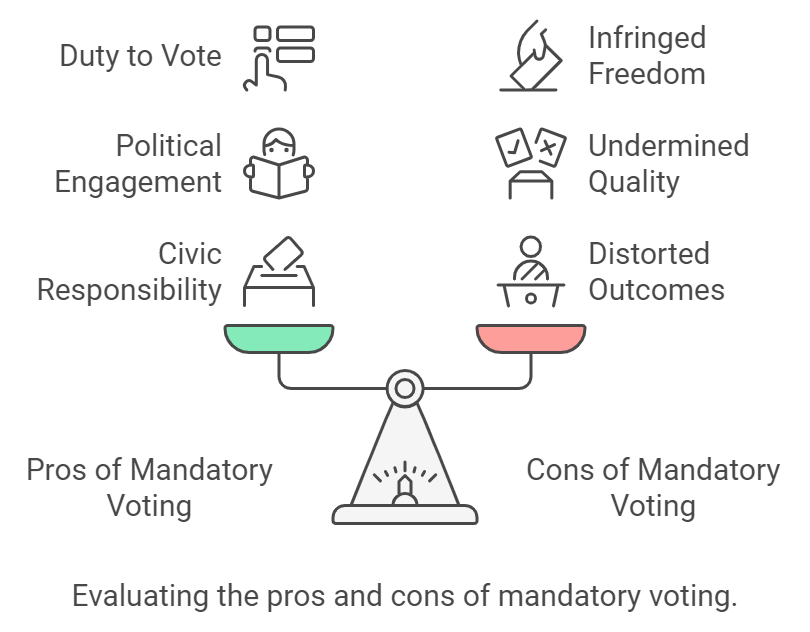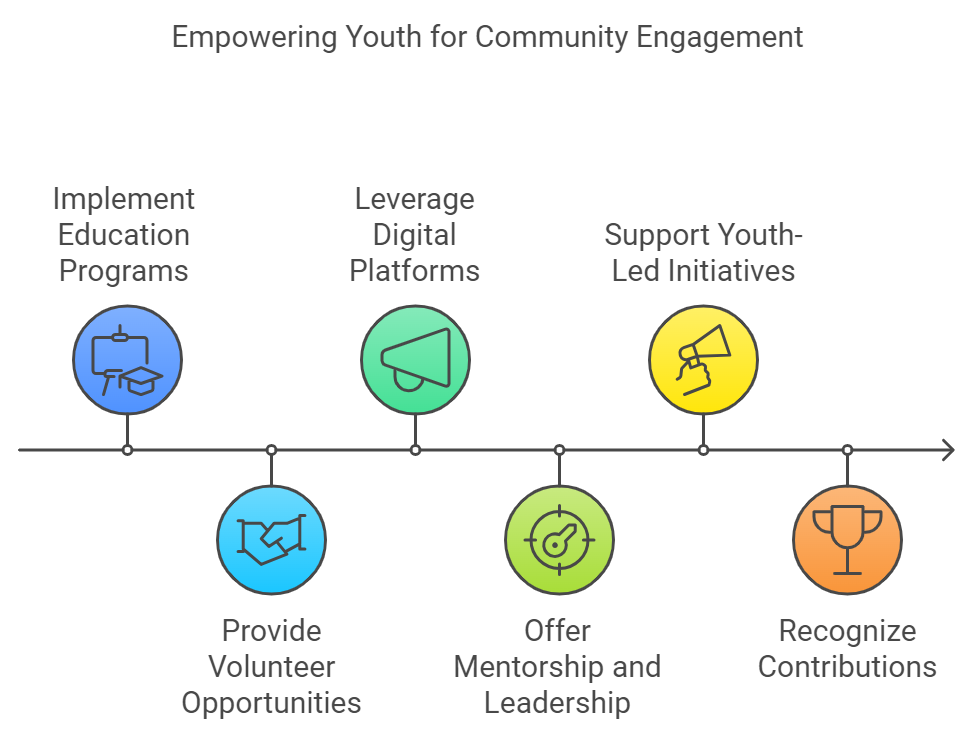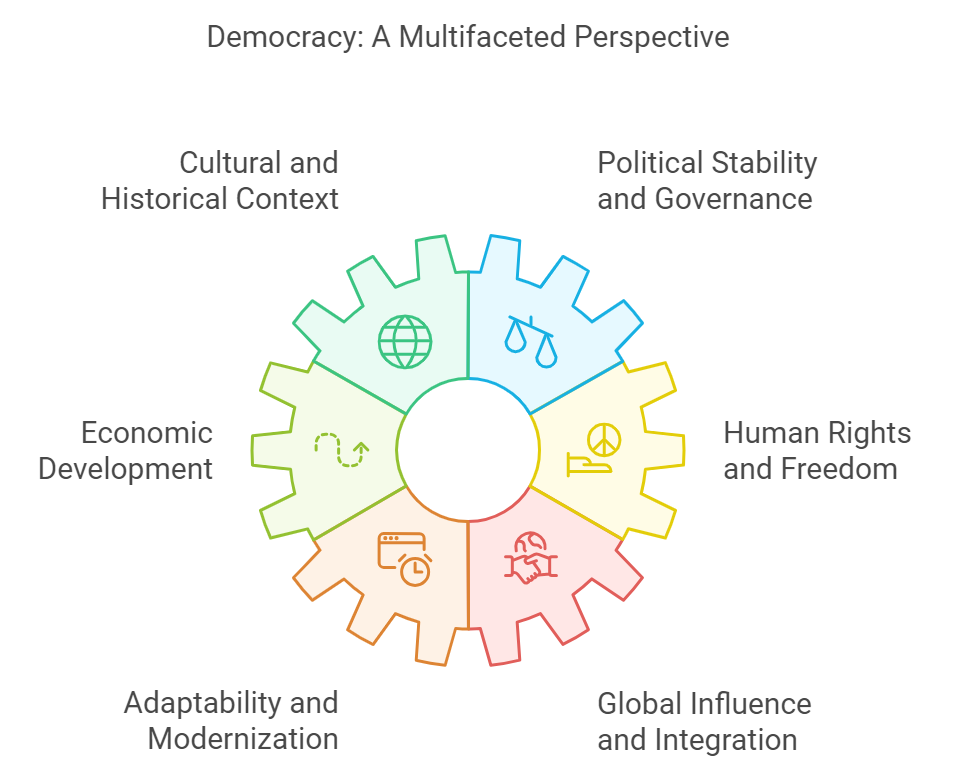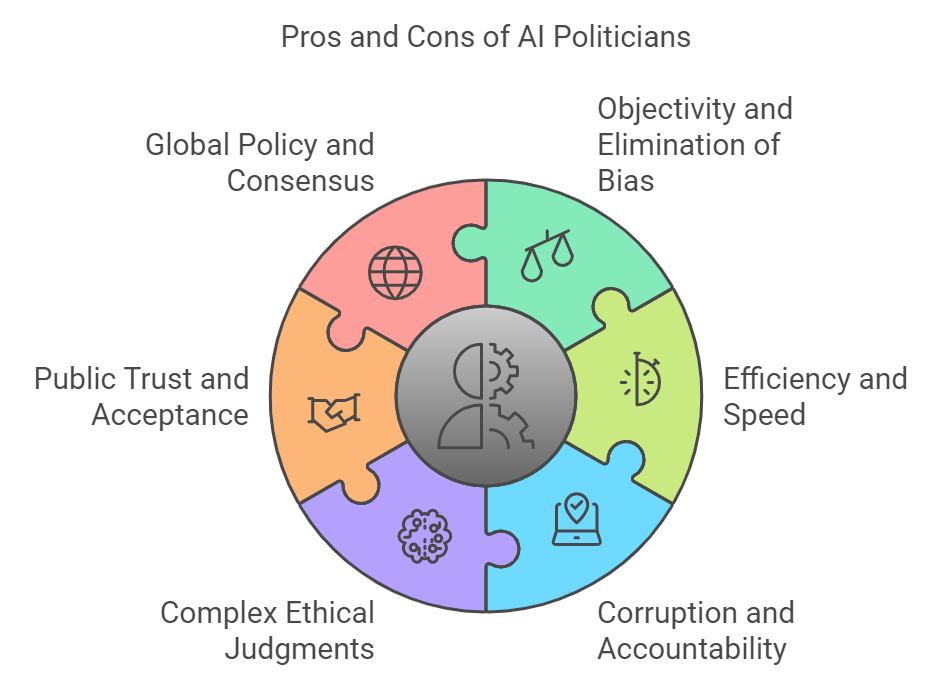目次
- 1 試験概要と流れ
- 2 トレーニング手順
- 3 スピーキング対策:健康分野の5つの質問
- 4 質問 1: Should all adults be required to vote?
- 5 質問 2: How can governments encourage young people to get involved in their communities?
- 6 質問 3: Is democracy the best type of government for all countries?
- 7 質問 4: Should online voting be implemented to increase voter turnout?
- 8 質問 5: Could AI politicians improve fairness and decision-making in politics?
試験概要と流れ
- 入室
- 「面接カード」を渡す
- 着席
- 氏名の確認と簡単な日常会話
- 「トピックカード」を受け取る:様々な分野が混ざっている
- スピーチ準備(1分間)
- スピーチ(2分間):概ね180〜240語(話すスピードによって異なる)
- Q&A(4分間)
スピーチの内容に関する2-3の質問 - 「トピックカード」返却
- 退室
トレーニング手順
- カテゴリー(分野)毎に観点とキーワード整理(10分程度)
- 実際にスピーチをして録音して聞き直す(2分+聞き直し)
- 満足できるまで数回繰り返す
- カテゴリー別に話せる様になったら本番形式(トピックが混ざったカード)でトレーニングを行う
スピーキング対策:健康分野の5つの質問
高齢化が進む日本で、英検1級二次試験でも健康トピックが出題されそうですね。
トレーニング用に同じ分野のトピックを5つ記載していますが、実際のトピックカードは、5つの異なる分野から出題されます。
- Should all adults be required to vote?
- How can governments encourage young people to get involved in their communities?
- Is democracy the best type of government for all countries?
- Should online voting be implemented to increase voter turnout?
- Could AI politicians improve fairness and decision-making in politics?
- すべての成人は投票を義務付けられるべきですか?
- 政府は若者が地域社会に関わるようにどう促せますか?
- 民主主義はすべての国にとって最良の政治制度ですか?
- 投票率を上げるためにオンライン投票を導入すべきですか?
- AI政治家は政治の公正さや意思決定を改善できるでしょうか?
質問 1: Should all adults be required to vote?
すべての成人は投票を義務付けられるべきですか?

論理展開・観点
- 民主主義の強化:全ての成人に投票を義務付けることで、より多くの人々が政治に関わり、民主主義が強化される。
- 個人の自由の侵害:投票を義務化することは、個人の自由を侵害し、投票しない権利を無視する可能性がある。
- 無知な投票のリスク:投票義務化により、十分な知識や関心を持たない人々が適当な判断で投票し、政治の質が低下するリスクがある。
Should All Adults Be Required to Vote?
I believe that all adults should not be required to vote.
One reason is that forcing people to vote may infringe on individual freedoms. In a democratic society, people should have the right to choose whether or not they want to participate in elections. Forcing someone to vote may lead to resentment and disengagement from the political process, especially for those who do not feel informed or interested in politics.
Another reason is that compulsory voting could result in uninformed voting. If people are required to vote, some may simply cast their vote without understanding the candidates or issues. This could lead to poorly informed decisions and negatively affect the quality of leadership and governance. Instead of forcing people to vote, governments should focus on improving voter education and engagement.
In conclusion, while increasing voter turnout is important, it is equally important to respect individual freedom and ensure that voters are making informed decisions. Rather than making voting compulsory, efforts should be made to encourage voluntary participation through education and public awareness campaigns. (173 words)
すべての成人は投票を義務付けられるべきですか?
私は、すべての成人に投票を義務付けるべきではないと考えています。
理由の一つは、投票を強制することが個人の自由を侵害する可能性があるからです。民主主義社会において、人々は選挙に参加するかどうかを自分で選ぶ権利があるべきです。政治に関心がない人々や十分な情報を持たない人々に投票を強制することは、政治に対する不満や無関心を生む可能性があります。
もう一つの理由は、義務的な投票が無知な投票を招くリスクがあることです。もし投票が義務化されると、一部の人々は候補者や問題について十分な理解がないまま、適当に投票してしまうかもしれません。これにより、質の低いリーダーシップや政治が生まれる可能性があります。政府は、投票を強制するのではなく、有権者の教育や関与を改善することに力を入れるべきです。
結論として、投票率の向上は重要ですが、同時に個人の自由を尊重し、有権者が情報に基づいた判断を下せるようにすることが必要です。投票を義務化するのではなく、教育や啓発活動を通じて自主的な参加を促すべきだと思います。
質問 2: How can governments encourage young people to get involved in their communities?
政府は若者が地域社会に関わるようにどう促せますか?

論理展開・観点
- ボランティア活動の奨励:政府がボランティア活動を奨励し、学校や大学と連携して地域活動を推進する。
- インセンティブの提供:若者が地域社会に関与することで得られる奨学金や資格などのインセンティブを提供する。
- テクノロジーの活用:ソーシャルメディアやアプリを通じて若者に地域活動の機会を伝えることができる。
How Can Governments Encourage Young People to Get Involved in Their Communities?
I believe governments can encourage young people to get involved in their communities by creating opportunities that align with their interests and offering incentives. One effective approach is to promote volunteer programs in schools and universities. Governments can collaborate with educational institutions to integrate community service into the curriculum or offer credits for participation. This not only encourages young people to contribute to their communities but also helps them develop valuable skills.
Another way to encourage community involvement is by offering incentives. Governments could provide scholarships, internships, or certification programs to young people who actively participate in local initiatives. These rewards give them a tangible reason to get involved and can help them see the long-term benefits of contributing to their community.
Finally, leveraging technology is crucial. Young people are highly engaged with social media and online platforms, so governments can use these tools to raise awareness about community projects and events. By making it easy for young people to find and join activities that match their interests, governments can increase participation. In conclusion, a combination of educational programs, incentives, and digital outreach can effectively encourage young people to become more involved in their communities. (195 words)
政府は若者が地域社会に関わるようにどう促せますか?
私は、政府が若者を地域社会に関与させるためには、彼らの興味に合った機会を提供し、インセンティブを用意することが重要だと考えています。一つの効果的な方法は、学校や大学でボランティア活動を推進することです。政府は教育機関と協力し、地域貢献をカリキュラムに組み込んだり、参加に対して単位を付与したりすることができます。これにより、若者は地域に貢献しながら、重要なスキルを身に付けることができます。
もう一つの方法は、インセンティブを提供することです。政府は、地域の活動に積極的に参加する若者に対して、奨学金やインターンシップ、資格プログラムを提供することができます。これにより、若者にとって地域貢献が具体的なメリットを伴い、長期的な利益を感じられるようになります。
最後に、テクノロジーの活用も重要です。若者はソーシャルメディアやオンラインプラットフォームを積極的に利用しているため、政府はこれらを活用して地域プロジェクトやイベントについての情報を発信することができます。若者が自分の興味に合った活動を簡単に見つけて参加できるようにすることで、参加率を高めることができます。結論として、教育プログラム、インセンティブ、デジタルリーチの組み合わせが、若者の地域社会参加を促進するための効果的な手段です。
質問 3: Is democracy the best type of government for all countries?
民主主義はすべての国にとって最良の政治制度ですか?

論理展開・観点
- 民主主義の利点:市民が政府に直接関与できる制度であり、自由や人権が保護される。
- 民主主義の課題:一部の国では政治的、文化的な背景や経済状況により、民主主義の導入が難しい場合がある。
- 状況に応じた制度:民主主義が理想的でない場合もあるため、それぞれの国に適した制度を選択するべきだという視点。
Is Democracy the Best Type of Government for All Countries?
I believe that democracy is an effective system for many countries, but it may not be the best type of government for all nations. One of the main advantages of democracy is that it allows citizens to have a direct say in how their government operates. It promotes freedoms, protects human rights, and gives people the opportunity to participate in political decisions. For many countries, this leads to a more stable and inclusive society.
However, democracy may not work as effectively in all countries. Some nations have political, cultural, or economic conditions that make democratic governance challenging to implement. For example, countries with deep social divisions, low levels of education, or weak institutions may struggle to establish a functioning democracy. In such cases, other forms of government might be more suitable in the short term while the necessary foundations for democracy are built.
In conclusion, while democracy has clear benefits and is an ideal system for many, it is not a one-size-fits-all solution. Governments should be designed based on the unique needs and circumstances of each country. The ultimate goal should be to create a system that ensures stability, prosperity, and fairness, regardless of whether it is democratic or not. (200 words)
民主主義はすべての国にとって最良の政治制度ですか?
私は、民主主義は多くの国にとって効果的な制度だと思いますが、すべての国にとって最良の政治制度であるとは限らないと考えています。民主主義の主な利点の一つは、市民が政府の運営に直接関与できることです。民主主義は自由を促進し、人権を保護し、人々が政治的な決定に参加する機会を提供します。多くの国では、これにより、より安定した包摂的な社会が実現します。
しかし、民主主義がすべての国で効果的に機能するとは限りません。いくつかの国では、政治的、文化的、経済的な状況により、民主主義の導入が困難です。たとえば、社会的分断が深刻な国や、教育水準が低い国、または制度が弱い国では、民主主義を確立するのに苦労することがあります。そのような場合、短期的には他の形態の政府の方が適しているかもしれませんが、将来的には民主主義を確立するための基盤が整備されるべきです。
結論として、民主主義には明確な利点があり、多くの国にとって理想的な制度ですが、すべての国に一律に適用できる解決策ではありません。政府の形態は、各国の特有のニーズや状況に基づいて設計されるべきです。最終的な目標は、民主主義かどうかにかかわらず、安定、繁栄、公平を実現する制度を構築することです。
質問 4: Should online voting be implemented to increase voter turnout?
投票率を上げるためにオンライン投票を導入すべきですか?
論理展開・観点(日本語)
- 投票の利便性向上:オンライン投票を導入することで、場所を問わず投票でき、忙しい人や移動が難しい人も参加しやすくなる。
- セキュリティとプライバシーの懸念:サイバー攻撃や不正投票のリスクがあり、オンライン投票は安全性を確保するために慎重に導入する必要がある。
- デジタルデバイドの影響:インターネットにアクセスできない人々や、技術に不慣れな人々が参加しにくくなる可能性がある。
Should Online Voting Be Implemented to Increase Voter Turnout?
I believe that online voting could help increase voter turnout by making the voting process more accessible and convenient. One of the main benefits of online voting is that it allows people to vote from anywhere, at any time. This would be especially helpful for those who have busy schedules, live in remote areas, or have physical limitations that make it difficult to vote in person. By making voting easier, more people may be encouraged to participate in elections, leading to higher voter turnout.
However, online voting also raises significant security and privacy concerns. Cybersecurity threats, such as hacking and fraudulent voting, could undermine the integrity of elections. It is crucial that any online voting system is thoroughly tested and equipped with the highest levels of security to prevent such risks. In addition, ensuring voter privacy while using online systems is essential to maintain trust in the democratic process.
Finally, the digital divide must be considered. Not everyone has access to reliable internet or is comfortable using technology. This could create inequalities in voter participation, where certain groups, such as the elderly or low-income individuals, may be left out.
In conclusion, while online voting has the potential to increase voter turnout, it must be implemented carefully, with attention to security and accessibility. (212 words)
投票率を上げるためにオンライン投票を導入すべきですか?
私は、オンライン投票を導入することで、投票率を上げることができると考えています。オンライン投票の主な利点の一つは、いつでもどこからでも投票ができるという点です。これは、忙しい人や遠隔地に住む人、身体的な理由で投票所に行けない人にとって特に有用です。投票をより簡単にすることで、より多くの人々が選挙に参加しやすくなり、結果として投票率の向上が期待できます。
しかし、オンライン投票にはセキュリティとプライバシーに関する懸念もあります。ハッキングや不正投票などのサイバーセキュリティの脅威は、選挙の完全性を損なう可能性があります。そのため、オンライン投票システムは、十分なテストを行い、最高水準のセキュリティ対策を講じる必要があります。また、オンラインで投票する際にも、有権者のプライバシーを確保することが、民主主義への信頼を維持するために不可欠です。
さらに、デジタルデバイド(情報格差)にも注意が必要です。すべての人が安定したインターネットにアクセスできるわけではなく、技術に不慣れな人もいます。このため、特に高齢者や低所得者層など、一部のグループが投票に参加しにくくなる可能性があります。
結論として、オンライン投票は投票率の向上に貢献する可能性があるものの、導入に際してはセキュリティやアクセスのしやすさに十分配慮する必要があります。
質問 5: Could AI politicians improve fairness and decision-making in politics?
AI政治家は政治の公正さや意思決定を改善できるでしょうか?

論理展開・観点
- 公正さの向上:AIは感情や利己的な利益に左右されないため、データに基づいた公正な意思決定が期待できる。
- 限界:AIには共感や道徳的な判断が欠如しており、人間の価値観を考慮した判断ができない場合がある。
- 補助的な役割:AIは政治家の補助ツールとして、データ分析や予測を通じて意思決定をサポートすることで、より公正で効率的な政治が実現できるかもしれない。
Could AI Politicians Improve Fairness and Decision-Making in Politics?
I believe that AI politicians could potentially improve fairness and decision-making in politics, but only in certain areas. One of the main advantages of AI is that it can make decisions based solely on data and logic, without being influenced by personal biases, emotions, or self-interest. This could lead to more impartial and objective decision-making, which would enhance fairness in political processes. For example, AI could analyze vast amounts of data to identify the most effective policies or allocate resources more efficiently.
However, AI also has limitations. While it excels in processing data, it lacks the ability to understand human emotions, empathy, or moral considerations. Political decisions often require a balance between facts and human values, which AI may struggle to navigate. For instance, policies that impact people’s well-being cannot always be decided purely by data; human compassion and ethical judgment are often needed.
In conclusion, while AI has the potential to support fairness and improve decision-making in certain technical aspects of governance, it is unlikely to fully replace human politicians. Instead, AI could play a valuable role as a tool to assist human leaders, helping them make more informed and unbiased decisions while maintaining the human element necessary for ethical governance. (202 words)
AI政治家は政治の公正さや意思決定を改善できるでしょうか?
私は、AI政治家が政治の公正さや意思決定を改善する可能性があると考えていますが、それは限られた分野においてです。AIの主な利点の一つは、個人的な偏見や感情、利己的な利益に左右されずに、データと論理に基づいた決定を下せることです。これにより、政治過程においてより公平で客観的な意思決定が可能になり、公正さが向上するでしょう。たとえば、AIは膨大なデータを分析し、最も効果的な政策や資源の配分を見つけることができるかもしれません。
しかし、AIには限界もあります。AIはデータ処理に優れていますが、人間の感情や共感、道徳的な判断を理解することができません。政治的な意思決定には、事実と人間の価値観をバランスよく考慮することが求められる場面が多くありますが、AIはその点で苦労するかもしれません。たとえば、人々の幸福に影響を与える政策は、単にデータだけで決定できるものではなく、時には人間の共感や倫理的な判断が必要です。
結論として、AIはガバナンスの技術的側面で公正さをサポートし、意思決定の向上に貢献する可能性がありますが、完全に人間の政治家に取って代わることは難しいでしょう。その代わりに、AI は人間のリーダーを支援するツールとして貴重な役割を果たす可能性があり、倫理的ガバナンスに必要な人間の要素を維持しながら、リーダーがより情報に基づいた公平な意思決定を行えるように支援します。
英検1級トピック探しにおススメのサイト:Britanica ProCon.org




